Truck Payload Vs. Towing Capacity: What’s the Difference?
January 14, 2023
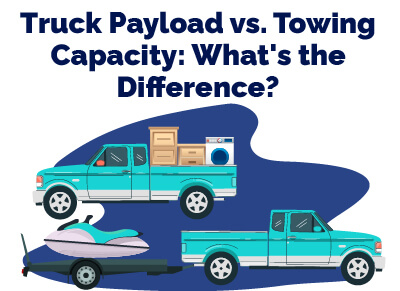

I am a serial entrepreneur and a consumer advocate. When I’m not helping car buyers, I love working on ventures that have a positive impact.
I run a cause marketing agency and serve on the board of Vayu Global Health where we are disrupting the medical industry and preventing the needless deaths of mothers and babies during childbirth.
Are you trying to decide between a truck with payload capacity or one with towing capacity? It's important to understand the differences between truck payload vs. towing capacity before making your decision. Payload and Towing capacities are two of the most important factors when selecting a vehicle for carrying heavy loads, so it’s essential that you know which is right for your needs.
We will explore what exactly payload and towing capacities mean, how they differ from each other, and how best to choose the perfect truck for all of your hauling needs!
Table of Contents
What is Payload Capacity?
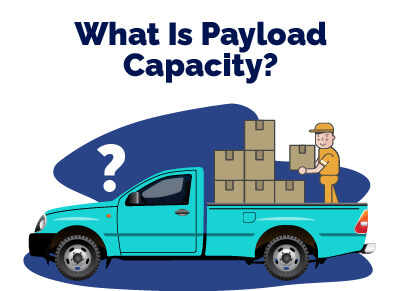
Payload capacity is the maximum amount of weight a truck can safely carry in its cargo area, including passengers and cargo. Knowing your truck's payload capacity is important for safety reasons as well as to ensure that you don't overload your vehicle.
To calculate your truck’s payload capacity, subtract the unloaded vehicle weight (UVW) from the Gross Vehicle Weight Rating (GVWR). The UVW is listed on a label inside the driver’s side door jamb and should also be included in your owner’s manual; GVWR can usually be found on an information sticker located near where you fill up with gas. Subtracting these two numbers will give you an estimate of how much weight your truck can safely carry without being overloaded.
Key Takeaway: It is important to know your truck's payload capacity for safety and performance reasons. To calculate it, subtract the unloaded vehicle weight (UVW) from the Gross Vehicle Weight Rating (GVWR). This will give you an estimate of how much weight your truck can safely carry without being overloaded.
What is Towing Capacity?
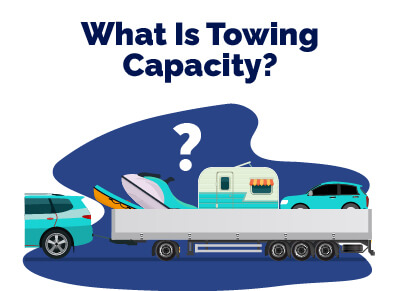
Towing capacity is the maximum amount of weight a truck can safely tow behind it. Knowing your truck's towing capacity is important for ensuring that you don't overload your vehicle and put yourself in danger while hauling heavy loads.
Definition of Towing Capacity
Towing capacity refers to the maximum weight that a truck can safely pull behind it, including any trailers or other vehicles attached to it. This includes both loaded and unloaded weights, so even if you are not carrying anything on the trailer, its empty weight still counts towards your total towing capacity. It is important to note that this number does not include the weight of passengers or cargo inside the cab of the truck itself; only items being towed by the truck count towards its total towing capacity.
Calculating Towing Capacity
The easiest way to calculate your vehicle's exact towing capacity is by consulting with an experienced mechanic who can inspect your specific make and model of car or truck and provide you with an accurate figure based on their findings. However, there are also some online resources available which offer general estimates for different types of vehicles based on their engine size and type as well as other factors such as body style and transmission type. These estimates should be used as a guideline only; always consult with an expert before attempting any heavy-duty hauling tasks with your vehicle.
Benefits Of Knowing Your Truck’s Towing Capacity
Knowing exactly how much weight your vehicle can safely tow will help ensure that you do not overload it when transporting goods from one place to another. Additionally, knowing what kind of load limit each axle has will allow you to determine whether adding extra axles would be beneficial in order to reduce stress placed on individual components during transport - something which could save money in terms of repairs down the line. Finally, understanding how much additional equipment (such as brakes) may need to be added onto a trailer before hitting certain speeds will help keep everyone safe while traveling at high speeds over long distances.
Key Takeaway: Knowing your vehicle's towing capacity is important for safe and efficient hauling. This includes loaded and unloaded weights, but not the weight of passengers or cargo inside the cab. Calculating towing capacity should be done by an experienced mechanic, but online resources can provide general estimates. Benefits include avoiding overloads, reducing stress on components, and understanding what additional equipment may need to be added before hitting certain speeds.
How to Choose the Right Truck for Your Needs?
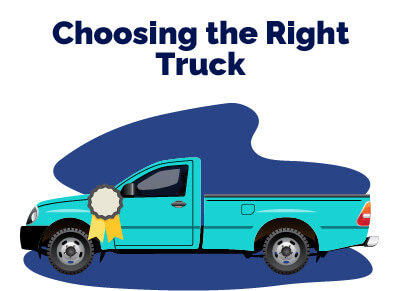
When it comes to choosing the right truck for your needs, there are several factors that you need to consider. Payload and towing capacities are two of the most important considerations when selecting a truck. Knowing what these terms mean and how they affect your vehicle’s performance can help you make an informed decision about which truck is best for you.
Considerations When Choosing a Truck for Payload and Towing Capacities
Payload capacity refers to the amount of weight that a vehicle can safely carry in its cargo area or bed. This includes any items such as tools, equipment, or supplies that may be loaded into the vehicle before driving off. It is important to know your payload capacity so that you don’t overload your vehicle with too much weight, which could cause damage or even lead to an accident.
Towing capacity refers to the maximum amount of weight that a vehicle can tow safely behind it while driving on public roads without putting undue strain on its engine or transmission system. If you plan on using your truck for hauling trailers or other large loads, then knowing its tow rating will help ensure safe operation while also preventing costly repairs down the road due to overloading issues.
Factors To Consider When Selecting A Truck For Maximum Payload And Towing Capacities
When selecting a truck based on payload and/or tow ratings, there are several factors that should be taken into consideration including engine size, axle ratio (the number of revolutions per mile), gross combined weight rating (GCWR)—this is total combined weight limit of both trailer plus load—as well as suspension type (leaf springs vs coil springs). Additionally, if planning on hauling heavy loads often, then opting for 4-wheel drive might be beneficial since it offers improved traction in slippery conditions compared to 2-wheel drive models.
Tips For Finding The Right Truck For Your Needs Based On Payload And Towing Capacities
To find out exactly what kind of payload and/or tow ratings your prospective new truck has available, first check online resources such as manufacturer websites where specifications like these are typically listed clearly alongside other information about each model's features and capabilities. Alternatively, consult with sales staff at dealerships who should have access to more detailed information regarding specific vehicles' ratings if needed. Additionally, researching reviews from current owners who have experience using their trucks under similar conditions can provide helpful insight into how different models perform in real world scenarios when carrying heavier loads than those listed by manufacturers in their specs sheets alone. This way potential buyers can get an idea ahead of time whether certain trucks will meet their needs prior to handling them personally before making purchase decisions based solely off looks alone.
Key Takeaway: When selecting a truck for payload and towing capacities, consider factors such as engine size, axle ratio, GCWR and suspension type. Research online resources or consult with sales staff at dealerships for detailed information about the vehicle's ratings. Additionally, read reviews from current owners who have experience using their trucks under similar conditions.
Common Misconceptions About Payload and Towing Capacities
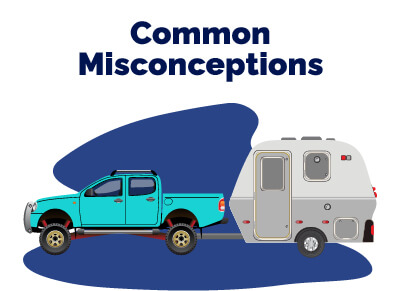
When it comes to payload and towing capacities, there are several misconceptions that can lead people astray when choosing the right truck for their needs. It’s important to understand the truth behind these misconceptions in order to make an informed decision.
Misconceptions About the Relationship Between Payload and Towing Capacities
One of the most common misunderstandings is that payload capacity and towing capacity are related. This is not true; they are two separate measurements with different purposes. Payload capacity measures how much weight a vehicle can safely carry inside its cab or bed, while towing capacity measures how much weight a vehicle can safely tow behind it.
Misconceptions About the Impact of Weight on Payload and Towing Capacities
Another misconception is that heavier vehicles have higher payload and/or towing capacities than lighter ones. While this may be true in some cases, it isn’t always so straightforward. Other factors such as engine size, transmission type, suspension system, etc., also play a role in determining these capacities.
Misconceptions About the Effectiveness of Aftermarket Upgrades on Payload and Towing Capacities
Many people believe that aftermarket upgrades such as larger tires or stronger springs will increase their truck's payload or towing capabilities without affecting safety or performance negatively - this is not necessarily true either. Such modifications should only be done if they're specifically designed for your specific model of truck; otherwise you could end up damaging your vehicle or putting yourself at risk while driving with heavy loads.
Key Takeaway: Payload and towing capacities are two separate measurements with different purposes, and the weight of a vehicle is not always indicative of its capacity. Aftermarket upgrades should only be done if they're specifically designed for your truck model in order to avoid damaging your vehicle or putting yourself at risk while driving with heavy loads.
Safety Tips for Driving With Heavy Loads?
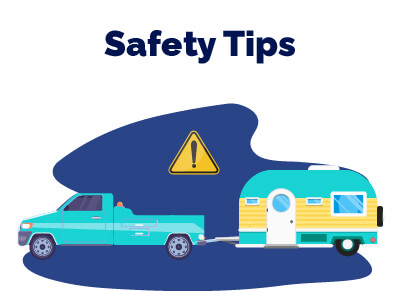
When driving with heavy loads, it is important to take certain safety precautions before, during, and after hauling them in order to ensure safe operation of your vehicle.
Before you hit the road with a heavy load, make sure that all of your truck’s systems are functioning properly. Check the brakes, steering system, tires (including tire pressure), lights and signals. Make sure that any cargo or trailer being hauled is securely attached to the truck so that it won’t shift while in motion. Also check for any loose items inside the cab or bed of the truck as these can become projectiles if not secured properly.
When driving with a heavy load it is important to drive slower than normal and allow extra time for braking and turning maneuvers due to increased weight on your vehicle. Pay close attention when merging onto highways or making turns at intersections as these require more time when carrying heavier loads. It is also important to keep an eye out for potholes and other road hazards which can cause damage when traveling at higher speeds with a heavy load in tow.
Once you have arrived at your destination, be sure to perform post-trip safety checks such as checking tire pressure again after unloading cargo from your vehicle, as well as inspecting brakes and suspension components for signs of wear or damage caused by hauling a heavy load over long distances. Additionally, inspect any straps used during transport for signs of fraying or weakening due to use over time which could lead to failure while transporting goods in future trips.
Key Takeaway: When hauling heavy loads, it is important to take certain safety precautions before, during and after the trip such as: pre-trip system checks; slower driving speeds; extra time for braking and turning maneuvers; post-trip safety checks.
Best Car Deals by Category
Frequently Asked Questions
Is payload more important than towing capacity?
It depends on the purpose of the vehicle. If you plan to use it for everyday driving, then payload is likely more important than towing capacity. Payload includes passengers and cargo weight, so if you need a car that can carry multiple people or large amounts of cargo, then payload should be your priority. On the other hand, if you are looking for a vehicle that will tow heavy loads such as boats or trailers, then towing capacity should be your main focus. Ultimately, it comes down to what type of activities you plan on using the car for and which features are most important in order for it to meet those needs.
Is payload the same as towing capacity?
No, payload and towing capacity are not the same. Payload is the total weight of cargo, passengers, and any additional equipment that can be carried in a vehicle. Towing capacity is the maximum amount of weight a vehicle can safely tow when connected to a trailer or other towed object. The two capacities are related but distinct; one should always check both before attempting to tow something with their car or truck.
Does payload capacity matter when towing?
Yes, payload capacity does matter when towing. Payload capacity is the maximum amount of weight a vehicle can safely carry and tow. It includes the weight of passengers, cargo, and any additional items being towed. If you exceed your vehicle's payload capacity while towing, it could lead to poor handling or even damage to the suspension system or other components of your car. It is important to check your owner’s manual for exact specifications regarding your specific model before attempting any type of heavy-duty hauling with your vehicle.
Can you max payload and still tow?
Yes, it is possible to maximize payload and still tow. Depending on the vehicle you choose, there are a variety of options available that can help you achieve both goals. For example, some vehicles have larger cargo capacities or heavier-duty suspension systems which allow for increased payloads without sacrificing towing capacity. Additionally, certain trucks come with specialized packages designed specifically for hauling heavy loads while still providing adequate towing power. Ultimately, selecting the right vehicle is key when attempting to maximize payload and tow at the same time.
Posted in Car Buying Tips, Uncategorized |




